八年级英语上第二单元教案+新教材
- 格式:doc
- 大小:97.01 KB
- 文档页数:13
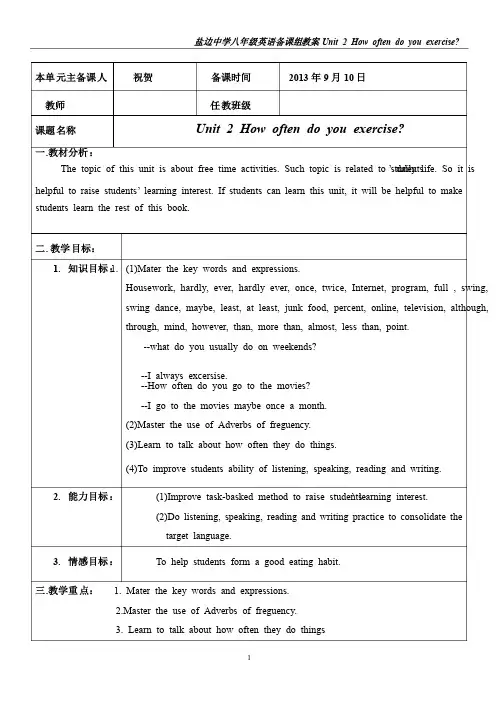
本单元主备课人祝贺 备课时间 2013年9月10日 教师任教班级 课题名称Unit 2 How often do you exercise? 一.教材分析: The topic of this unit is about free time activities. Such topic is related to students ’ daily life. So it is helpful helpful to to to raise raise raise students students students’’ learning learning interest. interest. interest. If If If students students students can can can learn learn learn this this this unit, unit, unit, it it it will will will be be be helpful helpful helpful to to to make make students learn the rest of this book. 二. 教学目标:1. 知识目标: 1. (1)Mater the key words and expressions. Housework, hardly, ever, hardly ever, once, twice, Internet, program, full , swing, swing dance, maybe, least, at least, junk food, percent, online, television, although, through, mind, however, than, more than, almost, less than, point. --what do you usually do on weekends? --I always excersise. --How often do you go to the movies? --I go to the movies maybe once a month. (2)Master the use of Adverbs of freguency. (3)Learn to talk about how often they do things. (4)To improve students ability of listening, speaking, reading and writing. 2. 能力目标:(1)Improve task-basked method to raise students ’ learning interest. (2)Do (2)Do listening, listening, listening, speaking, speaking, speaking, reading reading reading and and and writing writing writing practice practice practice to to to consolidate consolidate consolidate the the target language. 3. 情感目标: To help students form a good eating habit. 三.教学重点: 1. Mater the key words and expressions. 2.Master the use of Adverbs of freguency. 3. Learn to talk about how often they do things 四.教学难点: 1.Master the use of Adverbs of freguency. 2. To improve students ability of listening, speaking, reading and writing. 五.课时分配:Six periods: The first period: Section A(1a-2d) The second period: SectionA(Grammer focus -3c) The third period: Section B(1a-1e) The fourth period: SectionB(2a-2e) The fifth period: SectionB(3a-4)-self check The six period: 讲解本单元练习题讲解本单元练习题上课时间:备课时间:上课时间:备课时间:Activities How often Take a shower Wash your hair exercise Clean your room 上课时间:备课时间:上课时间:备课时间:ON BLACKBOARD Unit 1 I always get up early. I am n evernever late for class. every night. I sleep n inenine hours e very night. always usually often hardly ever never of course , pretty healthy/good ,unhealthy ,a healthy lifestyle, try to do sth.., look after, help sb. to do sth., study better, the same as, be different from Period 5 Section B ( 上课时间:备课时间:上课时间:备课时间:。
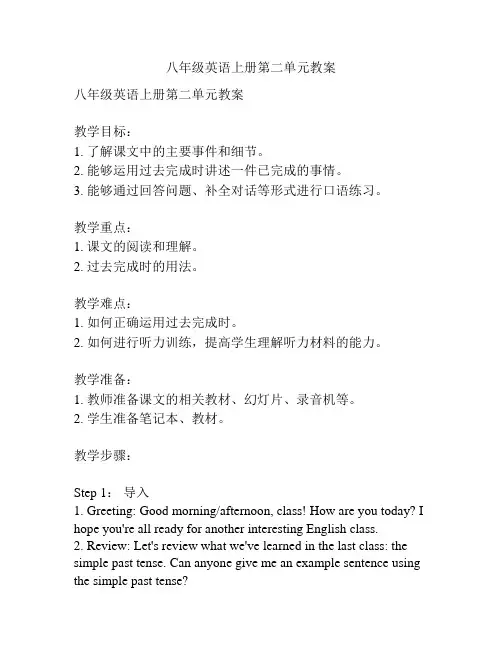
八年级英语上册第二单元教案八年级英语上册第二单元教案教学目标:1. 了解课文中的主要事件和细节。
2. 能够运用过去完成时讲述一件已完成的事情。
3. 能够通过回答问题、补全对话等形式进行口语练习。
教学重点:1. 课文的阅读和理解。
2. 过去完成时的用法。
教学难点:1. 如何正确运用过去完成时。
2. 如何进行听力训练,提高学生理解听力材料的能力。
教学准备:1. 教师准备课文的相关教材、幻灯片、录音机等。
2. 学生准备笔记本、教材。
教学步骤:Step 1:导入1. Greeting: Good morning/afternoon, class! How are you today? I hope you're all ready for another interesting English class.2. Review: Let's review what we've learned in the last class: the simple past tense. Can anyone give me an example sentence using the simple past tense?Step 2:阅读理解1. 通过展示课文中的图片和标题,引导学生预测故事的大概内容。
2. 播放课文的录音,让学生跟读。
3. 让学生回答一些关于课文的问题,以检测他们对课文内容的理解。
例如:What was the main event in the story? How did the children feel about the trip?4. 给学生分发练习册第二页,让他们完成其中的阅读练习。
Step 3:语法讲解1. 引导学生回忆过去完成时的用法。
例如:It expresses an action that happened before another action in the past. It is used to show that the action was completed before the other action happened.2. 通过示例句子和练习,让学生掌握过去完成时的构成和用法。
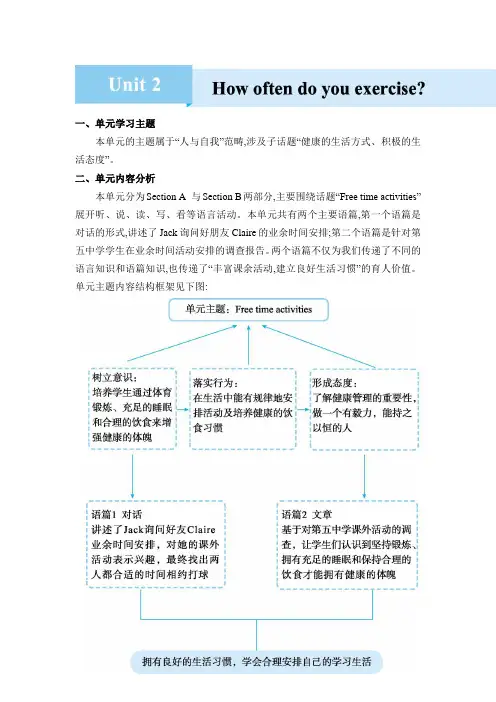
一、单元学习主题
本单元的主题属于“人与自我”范畴,涉及子话题“健康的生活方式、积极的生活态度”。
二、单元内容分析
本单元分为Section A 与Section B两部分,主要围绕话题“Free time activities”展开听、说、读、写、看等语言活动。
本单元共有两个主要语篇,第一个语篇是对话的形式,讲述了Jack询问好朋友Claire的业余时间安排;第二个语篇是针对第五中学学生在业余时间活动安排的调查报告。
两个语篇不仅为我们传递了不同的语言知识和语篇知识,也传递了“丰富课余活动,建立良好生活习惯”的育人价值。
单元主题内容结构框架见下图:。
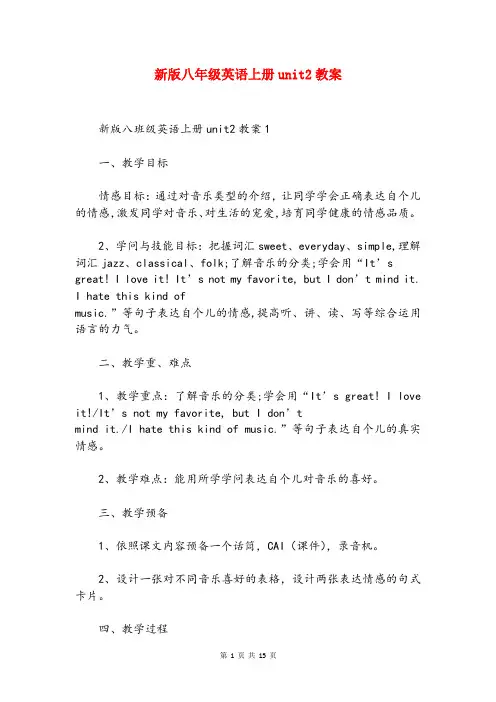
新版八年级英语上册unit2教案新版八班级英语上册unit2教案1一、教学目标情感目标:通过对音乐类型的介绍,让同学学会正确表达自个儿的情感,激发同学对音乐、对生活的宠爱,培育同学健康的情感品质。
2、学问与技能目标:把握词汇sweet、everyday、simple,理解词汇jazz、classical、folk;了解音乐的分类;学会用“It’s great! I love it! It’s not my favorite, but I don’t mind it.I hate this kind ofmusic.”等句子表达自个儿的情感,提高听、讲、读、写等综合运用语言的力气。
二、教学重、难点1、教学重点:了解音乐的分类;学会用“It’s great! I love it!/It’s not my favorite, but I don’tmind it./I hate this kind of music.”等句子表达自个儿的真实情感。
2、教学难点:能用所学学问表达自个儿对音乐的喜好。
三、教学预备1、依照课文内容预备一个话筒,CAI(课件),录音机。
2、设计一张对不同音乐喜好的表格,设计两张表达情感的句式卡片。
四、教学过程Step l Leading—in activities用多媒体播放一首同学平常学过的英语歌,让同学共同跟随音乐演唱,营造轻松的学习氛围。
询问同学一些询问题:Do you like music?Why?/What do you think of the music? Step 2 Role-task(1)Task1:呈现生词jazz、classical、folk,接着用多媒体播放相对应的音乐,让同学推想jazz、classical、folk的意思,如有错误加以订正。
听过音乐之后,询询问同学听音乐的感受,引导同学认知sweet。
(2)Task 2:阅读2a短文内容,布置略读任务,提出简洁的询问题:How many kinds of music do you learn fromthe passage? What are they?同学回答询问题后,让同学再读一遍课文,布置细读任务,提出更深层次的询问题:Where do people usually enjoy classical music? What is pop music? Who is famous for folkmusic?请同学回答,接着订正答案,跟着录音机读短文一遍。
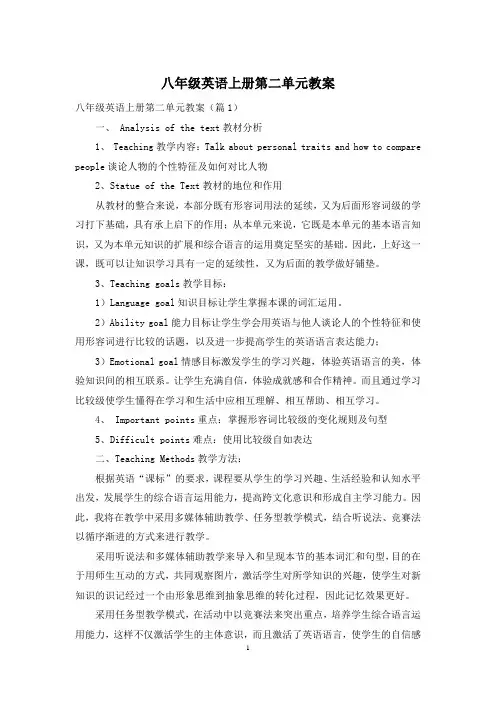
八年级英语上册第二单元教案八年级英语上册第二单元教案(篇1)一、 Analysis of the text教材分析1、 Teaching教学内容:Talk about personal traits and how to compare people谈论人物的个性特征及如何对比人物2、Statue of the Text教材的地位和作用从教材的整合来说,本部分既有形容词用法的延续,又为后面形容词级的学习打下基础,具有承上启下的作用;从本单元来说,它既是本单元的基本语言知识,又为本单元知识的扩展和综合语言的运用奠定坚实的基础。
因此,上好这一课,既可以让知识学习具有一定的延续性,又为后面的教学做好铺垫。
3、Teaching goals教学目标:1)Language goal知识目标让学生掌握本课的词汇运用。
2)Ability goal能力目标让学生学会用英语与他人谈论人的个性特征和使用形容词进行比较的话题,以及进一步提高学生的英语语言表达能力;3)Emotional goal情感目标激发学生的学习兴趣,体验英语语言的美,体验知识间的相互联系。
让学生充满自信,体验成就感和合作精神。
而且通过学习比较级使学生懂得在学习和生活中应相互理解、相互帮助、相互学习。
4、 Important points重点:掌握形容词比较级的变化规则及句型5、Difficult points难点:使用比较级自如表达二、Teaching Methods教学方法:根据英语“课标”的要求,课程要从学生的学习兴趣、生活经验和认知水平出发,发展学生的综合语言运用能力,提高跨文化意识和形成自主学习能力。
因此,我将在教学中采用多媒体辅助教学、任务型教学模式,结合听说法、竞赛法以循序渐进的方式来进行教学。
采用听说法和多媒体辅助教学来导入和呈现本节的基本词汇和句型,目的在于用师生互动的方式,共同观察图片,激活学生对所学知识的兴趣,使学生对新知识的识记经过一个由形象思维到抽象思维的转化过程,因此记忆效果更好。
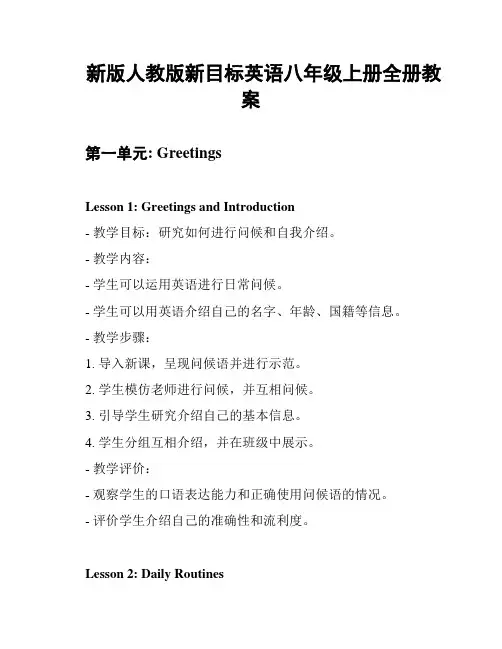
新版人教版新目标英语八年级上册全册教案第一单元: GreetingsLesson 1: Greetings and Introduction- 教学目标:研究如何进行问候和自我介绍。
- 教学内容:- 学生可以运用英语进行日常问候。
- 学生可以用英语介绍自己的名字、年龄、国籍等信息。
- 教学步骤:1. 导入新课,呈现问候语并进行示范。
2. 学生模仿老师进行问候,并互相问候。
3. 引导学生研究介绍自己的基本信息。
4. 学生分组互相介绍,并在班级中展示。
- 教学评价:- 观察学生的口语表达能力和正确使用问候语的情况。
- 评价学生介绍自己的准确性和流利度。
Lesson 2: Daily Routines- 教学目标:研究描述日常活动。
- 教学内容:- 学生能够运用英语描述自己的日常活动。
- 学生可以用英语叙述一天的活动安排。
- 教学步骤:1. 复前一课的内容,引导学生回忆日常活动的英语表达。
2. 引导学生研究新的日常活动的词汇和句型。
3. 学生分组分享自己的一天活动安排,并向全班汇报。
- 教学评价:- 观察学生对日常活动词汇和句型的掌握程度。
- 评价学生的口语表达和沟通能力。
第二单元: Hobbies and Leisure ActivitiesLesson 1: Hobbies- 教学目标:研究谈论自己的兴趣爱好。
- 教学内容:- 学生可以用英语描述自己的兴趣爱好。
- 学生可以运用所学词汇进行对话练。
- 教学步骤:1. 复前一课的词汇和句型。
2. 引导学生研究新的兴趣爱好词汇。
3. 学生分组进行对话练,谈论自己的兴趣爱好。
- 教学评价:- 观察学生对兴趣爱好词汇的掌握情况。
- 评价学生在对话练中的口语表达能力。
Lesson 2: Leisure Activities- 教学目标:研究谈论闲暇活动。
- 教学内容:- 学生能够用英语描述自己的闲暇活动。
- 学生能够与他人交流关于闲暇活动的话题。
- 教学步骤:1. 复前一课的词汇和句型。
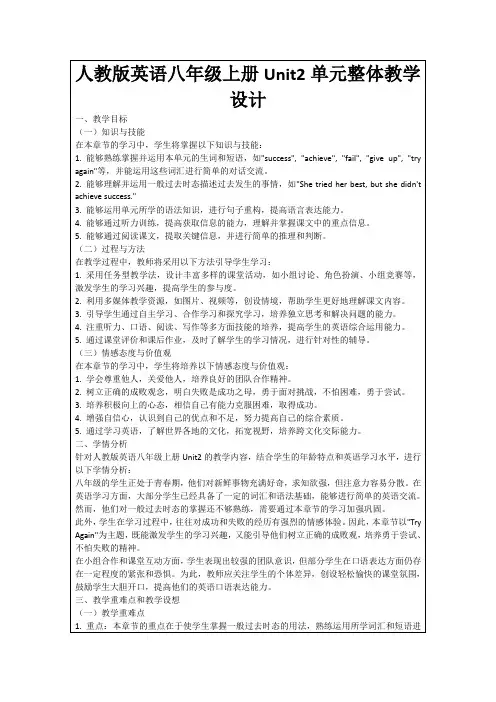
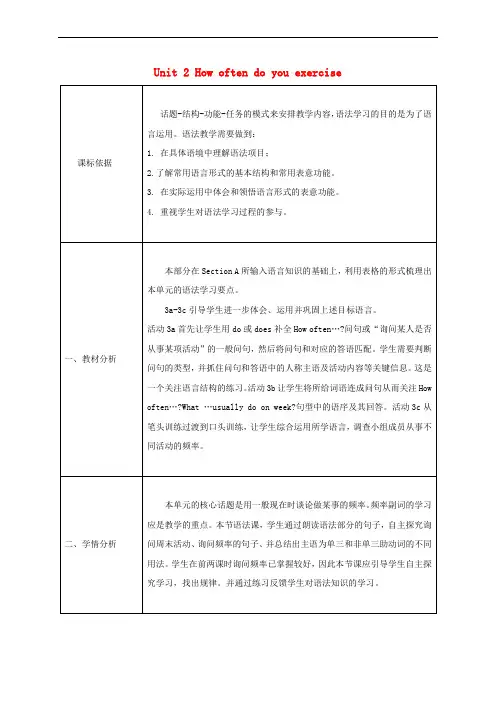
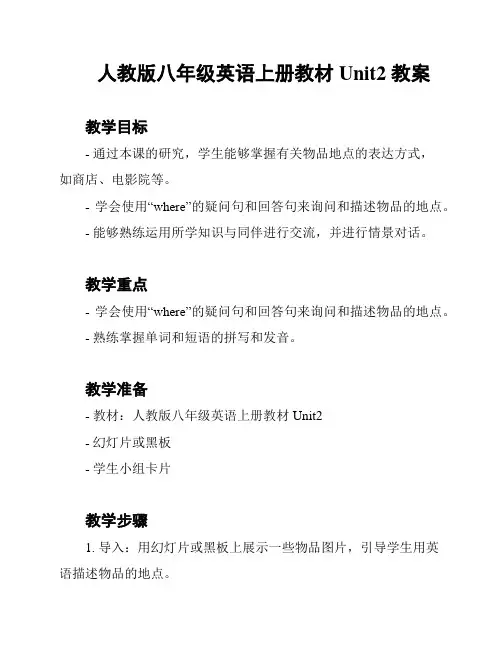
人教版八年级英语上册教材Unit2 教案
教学目标
- 通过本课的研究,学生能够掌握有关物品地点的表达方式,
如商店、电影院等。
- 学会使用“where”的疑问句和回答句来询问和描述物品的地点。
- 能够熟练运用所学知识与同伴进行交流,并进行情景对话。
教学重点
- 学会使用“where”的疑问句和回答句来询问和描述物品的地点。
- 熟练掌握单词和短语的拼写和发音。
教学准备
- 教材:人教版八年级英语上册教材Unit2
- 幻灯片或黑板
- 学生小组卡片
教学步骤
1. 导入:用幻灯片或黑板上展示一些物品图片,引导学生用英
语描述物品的地点。
2. 研究新知:通过教材Unit2的相关内容,教授目标词汇和短语,让学生理解并记忆。
3. 练活动:进行对话练,学生分组,每个小组选择一个物品进行情景对话,询问和回答物品的地点。
4. 拓展活动:让学生运用所学知识,创造自己的对话,交流物品的地点。
5. 归纳总结:让学生回顾所学知识,进行总结归纳。
6. 作业布置:布置课后作业,要求学生练复述本课内容,并使用疑问句和回答句描述物品地点。
教学评价
- 通过学生的课堂表现、练活动和讨论活动来进行评价,检查学生是否能够正确运用所学语言进行物品地点的描述。
- 提供及时的反馈,鼓励学生用英语进行交流。
注意事项
- 确保课堂秩序,引导学生积极参与。
- 注重学生的口语能力培养,鼓励他们进行对话练。
- 提供足够的练机会,让学生熟练掌握所学知识。
以上为人教版八年级英语上册教材Unit2的教案,根据课堂实际情况适当调整教学步骤。

新人教版八年级英语上册第二单元教学设计Unit 2 How often do you exercise?Section A 1 (1a—2d)一、教学目标:1。
语言知识目标:1)能掌握以下单词:housework,hardly, ever, hardly ever, once,twice, Internet, program, full, swing, swing dance, maybe, least, at least能掌握以下句型:①—What does he do on weekends?—He usually watches TV.②—How often do you watch TV? —I watch TV every day.③—Does he go shopping? -No, he never go shopping.2) 能了解以下语法:频度副词及一般现在时简单谈论周末活动情况。
2. 情感态度价值观目标:通过本单元的学习,养成健康的饮食习惯,保证充足的睡眠时间,进行合理的运动锻炼,以保持健康的体魄.培养学生的逻辑表述能力,激发学生的积极思维,并使学生互相了解,增进友谊,加强人际交往,以形成良好的人际关系。
二、教学重难点1。
教学重点:1)对6个频度副词细微差异的理解及使用。
2)弄清一般现在时在不同人称下动词形式及提问的变化.2. 教学难点:1) 第三人称单数谓语动词在此核心句型中的运用。
2)谈论课余时间的各项活动,以及初步认识和使用频率副词。
三、教学过程Ⅰ. Lead inTalk about your last weekend’s activities.Ⅱ. Presentation(1) 教师问:“What do you usually do on weekends ?” (并且板书)让学生根据自己的实际回答I usually …… on weekends.(2)教师出示动词卡片 watch TV,read books,exercise,swim, play football、go shopping、go to movies让学生回答.Ⅲ。

说课教案Unit 2 How often do you exercise?The First periodI Teaching Aim and Demands (教学目标与要求)1、Knowledge Objects (知识目标)Names of activities.Adverbs of frequency.What do you usually do on weekends?I often go to the movies.2、Ability Objects. (能力目标)Writing skill. Listening skill. Communicative competence.3、Moral object (情感目标)Keep a diary every day in English.Teaching Key Points. (教学重点)Watching TV, reading , shopping , skateboarding , exercising , Teaching Difficulties. (教学难点)Always, usually, often, sometimes, hardly, ever, never.What does she do on weekends?She often goes to the movies.I Teaching Methods. (教学方法)Discover method. Listening and writing methods. Pairwork.II Teaching Aids. (教学手段)A tape recorder.III Teaching Procedures (教学过程)Step1: Greet the class.Step2: Section A 1aFirst look at the picture, ask a few students to say what they see in the thought bubbles. Each thought bubble shows something a person does on weekends.Then name each activity. Ask students to repeat each one. Point out the sample answer. Then ask student to list all the activities . Then ask the student who finishes first to write the answers on the board .Check the answers:Watching TV reading skateboarding exercising shoppingStep3: 1bTeach new words. Read the new words to students. Ask them to repeat.Now, listen to the conversation . The people are talking about what they do on weekends.Please listen and write the letter after the word in the list.Answer:Always a usually c often e sometimes dHardly ever d never aStep 4: IC PairworkFirst ask two students to read the sample in speech bubbles.Now work with a partner. Make your own conversations about the people in the picture. The ask some pairs to present their conversations to the class.Step 5: SummaryThis class we ,ve learnt some names of .activities: watching TV , reading , skate-boarding , exercising , shopping . And we also learnt some adverbs of frequency: always usually, after, sometimes, hardly ever, never.Step 6: Homework1.Copy new words.2.Make conversations。
八年级上册英语unit2教案八年级英语教案对于课堂教学和教师的专业成长有着重要的价值和作用。
这是店铺整理的八年级上册英语unit 2教案,希望你能从中得到感悟!八年级上册英语unit 2教案(一)Grade8 Module1 Unit2上课教师学生年级初二教材《英语》(外研社)初二上册课时 Module 1 Unit 2教学设计课型 Reading and writing教材分析本模块为本学期的第一课,教师要充分利用这一模块的内容,培养学生学习的计划性和策略性,从而有效的指导学生学习。
教学目标 1.语言知识目标(1)词汇围绕本单元话题,学会准确地读出和使用improve, conversation, breath, basic, language, shy, remember, enjoy yourself, all the time等词语。
(2)语法巩固已学过的向别人提建议的表达方式和相应答语,能够使用What do you think? What should I do? How about…?进行表达和交流。
知识与能力能够读懂介绍建议的文章,并且能够用书信的方式提出学习建议。
过程与方法通过小组合作的方式,提高学生快速掌握文章脉络并且迅速获取有效信息的阅读能力;具有注重培养并逐步形成策略性学习的意识;巩固已学过的向他人提建议的英语表达方式及其答语,使学生会运用该结构进行表达与交流。
情感、态度与价值观通过学习提出建议,掌握与他人交流时语言的得体性,培养学生恰当的向他人提建议的方式,对他人的建议要表示感谢。
教学过程八年级上册英语unit 2教案(二)教学步骤活动目的教师活动学生活动1. Warming up andLead in 本活动的目的在于激活话题,为课文阅读提供引子,导入课文,通过题目谈论并预测文章内容。
激发学生学习兴趣,调动学习积极性。
T: What’s your favourite subject at school?Do you think English difficult?T: Show the title, and ask : What’s your problem about learning English? The students work in pairs and think about some questions they would like to ask .2. pre-reading 锻炼学生听力,并以此让学生能够初步了解文章大概内容,进一步熟悉本单元话题。
八年级英语上第二单元grammar教案教案标题:八年级英语上第二单元Grammar教案教学目标:1. 理解并正确使用本单元的语法重点——过去完成时。
2. 能够用过去完成时描述过去发生的动作或事件的先后顺序。
3. 能够在口语和书面表达中正确运用过去完成时。
教学重点:1. 掌握过去完成时的构成和用法。
2. 能够区分过去完成时和一般过去时的差异。
3. 能够在句子中正确使用过去完成时。
教学准备:1. 教材:《八年级英语上册》教材第二单元相关教材。
2. 多媒体设备:电脑、投影仪等。
教学过程:Step 1: 导入新知1. 引入话题:通过展示一张有关过去的图片,引导学生回忆过去的经历,并用一般过去时描述。
2. 引入过去完成时:提问学生是否知道如何表达过去的过去,引出过去完成时的概念。
Step 2: 讲解过去完成时的构成和用法1. 展示过去完成时的构成:主语 + had + 过去分词。
2. 解释过去完成时的用法:用于描述在过去某一时间或动作之前已经完成的动作或事件。
3. 通过例句和练习,让学生理解过去完成时的具体应用场景。
Step 3: 过去完成时与一般过去时的对比1. 对比过去完成时和一般过去时的区别:强调过去完成时是过去的过去,而一般过去时只是过去的一段时间。
2. 通过例句和练习,让学生进一步理解两者的差异。
Step 4: 运用过去完成时进行练习1. 给学生提供一些句子,让他们用过去完成时改写句子。
2. 给学生提供一些情境,让他们用过去完成时描述过去的经历。
3. 进行口语练习,让学生在对话中使用过去完成时。
Step 5: 总结与拓展1. 总结过去完成时的构成和用法。
2. 提醒学生在写作和口语表达中要注意使用过去完成时。
3. 鼓励学生在日常交流中多运用过去完成时。
Step 6: 作业布置1. 完成教材相关练习题。
2. 写一篇短文,描述自己最近一次的过去完成时的经历。
教学反思:本节课通过引入话题和概念,讲解过去完成时的构成和用法,并进行对比练习和口语练习,帮助学生理解和掌握过去完成时的使用。
《英语(新目标)》八年级上册第二单元教案Unit 2In this unit, it unfolds teaching around the topic of health, forcal point of studying isthe content like these:1. Teaching words and expression: Learning the use of “have a cold/stomache/toothache...,should, see a dentist, stressed out, lie down, get some rest....”2. Teaching Drills:① To talk about the topic of health, be able to answer the questions what the doctor ask.② Be able to give advice or make suggestions.3. Teaching Grammar:① Pay attention to the consistency between subject and object:I/You/They/We...+have...She/He/It/Tom...+has...② Give advice with should or shouldn'tⅠ.Teaching Aims:1. To talk about your health.2. To give advice and make suggestions3. To practice listening.Ⅱ.Main points1. Words and expressionsmatter, have/get a cold, stomachache, throat, backache, headache, toothache, fever, illness, stressed out, get tired, advice, rest, see a dentist, water, honey, balanced, diet, important, beef, lamb, tofu, bean sprout, stay healthy, on the other hand, at the moment.2. Sentence patternsWhat's the matter? I have a headache. You should go to bed.What's the matter with Sonja? She has a stomachache. She shouldn't eat anything for 24 hours.I hope you feel better soon. Do you have a sore throat? Yes, I do. You should drink hot teawith honey.Ⅲ.Difficult point: To give advice.Ⅳ.Period: 4 periodⅤ.Teaching method1. ListeningA. Listen and look at the picture. Then number the names [1-5]Nancy Sarah David Ben JudyB. Listen and fill in the blank.C. Listen. Write the problems in the chart below.2. Speaking(1) PairworkLook at the picture. Practice the conversation.For example:A: What's the matter with Sonja?B: She's tired.A: Well, she should go to bed early.She shouldn't go to the party.(2) GroupworkA. One student mimes an illness. The other students guess the illness and give advice.B. Choose a problem from the list below. Then ask classmates for advice. Write down the advice and the name of the person who gave you the advice. The student who gives the best adviceis “Dr Know”.3. ReadingRead the article. Underline the things you should do.4. WritingImagine that you and Sally are on a student exchange program. Read her letter, then writeback and give advice.Well, I hope you're enjoying my school in New York. I like your school in Beijing, but I'm not feeling very well at the moment. I'm tired and I have a lot of headaches. And I'm stressed out because my Mandarin isn't improving. I study late every night, sometimes until 2 am, but my speaking doesn’t improve. I really need some conversation practice! I think I'm gettinga cold, too ...5. Acting between the teachers and students(1) Look at the parts of body, touch the words what you hear.arm, hand, neck, back, head, nose, ear, leg, stomach, eye, mouth, tooth, foot.(2) Teaching the words according to actingtired, hungry, thirsty, stressed out.Ⅵ. Design for exercises.一、阅读理解。
八年级英语上Unit2教学设计八年级英语上Unit2教学设计八年级英语教案unit2篇一:八年级英语上Unit2教学设计八年级英语上Unit2教学设计SectionA1.BecauseBeijingwillhostthe2008Olympics.北京将主办2008年奥运会。
(1)host动词“主办”WhichcountrywillhostthenextOlympicGames?哪个国家将主办下一届奥运会。
(2)host名词“主人”Thehostintroducedmeattheparty.主人在聚会上介绍了我。
2.Moreandmoreforeignfriendsrideinmytaxinow.现在越来越多的外国朋友乘坐我的车。
foreign形容词:外国的,foreigncountry外国foreignpeople 外国人foreigner名词,外国人rideinmytaxi=takemytaxi3.Hereisaform.Pleasefillitout.这是一张表格,请填上。
form:动词,形成,组成;名词:表格fill?out=fillin填写Filloutthisform,please.请填写这张表。
当宾语是代词时,应放在中间。
如Fillitout.把它填好。
fillin如?theblanksfilltheblanksout填写空白处fillouttheblanksfilinlit?fillitout?填写它,而不能写成:filloutit知识拓展:fill?with?把?装满,用?填满Theglassisfilledwithwater.杯子里装满了水。
Youcanfillthebagwithbooks.foreignlanguage外国语言你可以把书包装满书。
4.IthinkIwillsitinaquietplaceinBeijing,watchingwhat’sgoing on.我想我将坐在北京一个安静的地方,观看周围发生着的事情。
Period 1 Section A (1a-2d)一、教学目标:1. 语言知识目标:1) 能掌握以下单词以及短语:Housework, hardly, ever, hardly ever, once, twice, Internet, program,full , swing, swing dance, maybe,2) 能熟悉以下句型:--what do you usually do on weekends?--I always excersise.--How often do you go to the movies?--I go to the movies maybe once a month.3) Be able to understand the dialogues about how often people do things.2. 能力目标:(1)Learn students work in pairs to do the cooperative work.(2)Learn the target language through listening and speaking practice.3.情感目标:Lead the students to keep a diary in English and do more exercise to keep healthy.二.教学重点:Master the words and target language;Master the sentence students structures “How often …?三. 教学难点:To improve students’ listening skill and cooperative skill.四.教学过程Step1 Learn some new words.Step2 Teach activity 1a.Call attention to the picture. Ask a few students to say what they can see in the thought bubblesPoint out the sample answers.Then ask students to lists all the activities in the thought bubbles.Check the answers on the blackboard and ask students to correct their own answers.Answers: help with housework, go shopping, read books, do exercise, watch TV.Call students’ attention to language point and analyze it.Step3 Teach activity 1b.Show six new words .Lead students to read the new words. Ask them to repeat.Step4 Play the recording the first time. Students only listen.Play the recording the second time.Point to the pictures and write the activities next to with whole words.Step5 Teach activities 2a and 2b.These two activities provide listening practice using the target language.Step 6 Get students to go through 2a,2b and understand the meaning and sentence pattern of each sentence. Then get them to listen to 2a and check the activities they hear.Step 7 Expalin language points.Step 8: Teach activity 2c.Ask students to read the list of activities.Ask students to look at the sample conversation and read it. Prompt them to make their own conversation like the sample.Step 9: Give students several minutes to ro-play conversation in pairs, ask them to underline and difficult point and get the main idea of it.Step 9: Summary.板书设计:Homewrok:课后反思:Period 2 Section A (Grammar focus-3c)1. 语言知识目标:1) 单词以及短语: maybe, least, at least.2)Learn to talk about how often you do things with the target language. Improve students’ speaking skill.Consolidate the use of simple present tense.2. 能力目标:Do some speaking practice to master how to talk about how often we do thins.3.情感目标:Educate the students to study hard and be a good student.二、教学重难点1. 教学重点:Master the new words and phrases;Master the target language.2.教学难点:Master the sentence students structures “How often …?三、教学过程Step1 Learn some new words and phrases.Step2 Grammar focus . Let the students read the text. Invite some students to read the sentences in the box and explain their Chinese meaning.为学生解释其中的语法点。
Step3 Teach activity 3a.练习题中重要的词组:stay up late at least play sportsStep4 Lead the students to read the instruction of this activity to know what to do and how to do it.1. Call attention to the survey .2.Make sure the Ss understand the chart .T: What activity do ninety-five percent of Green High students do every day ?3. Ss answer .If necessary, give them help .4. Review the information in the green box with Ss .5.Check the answers .6. Practise reading .Step53b. Use the words given to write questions. Then ask and answer them with a partner.Step6 3c What can you do to improve your English? Add more things to the chart.Then ask your classmate the questions and find the best English students.1.T: What can you do to improve your English ?(e.g. read English books, practice reading and speaking ) How often do you ··· ?2.Think of more things you can do to improve your English and write them here .3.Ask several Ss each question .4.See: Who is the best English students in the classAsk and answer: How often do you take a shower?How often does he take a shower?Let Ss ask and answer in pairs, using always, usually, often, sometimes, hardly ever(几乎没有) or never. Step9总结本节课所学内容。
板书设计:Homework.教学反思:Period 3 Section B (1a-1e)一、教学目标:1. 语言知识目标:1) 能掌握以下单词以及词组:junk food, percent, online, television, although, through, mind, however,how many, be good for, be bad for, every day.2)Learn to talk about how often they do things to keep healthy.How often do you drink milk, Liu Feng?How many hours do you sleep every night?She says it’s good for my health.2. 能力目标:通过本节课的学习,进一步巩固频率副词的用法,使学生听、说、读、写的能力得到锻炼。